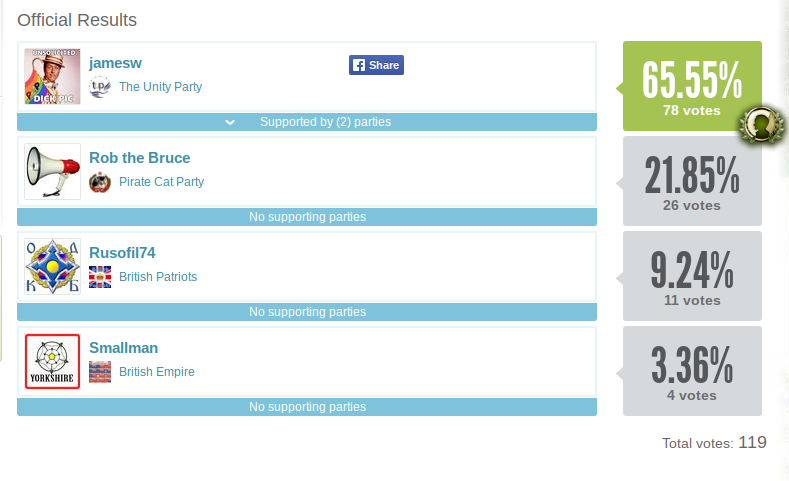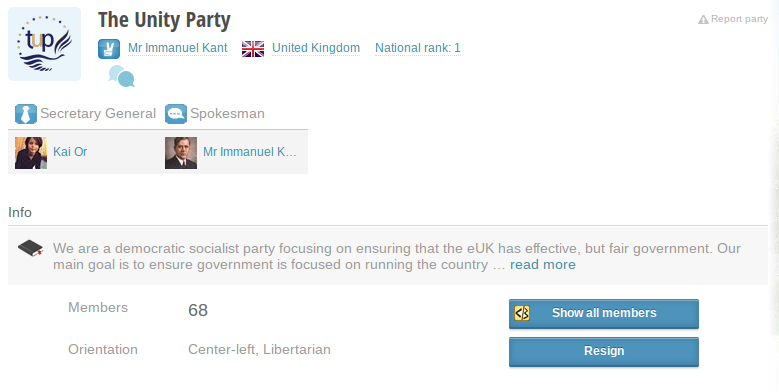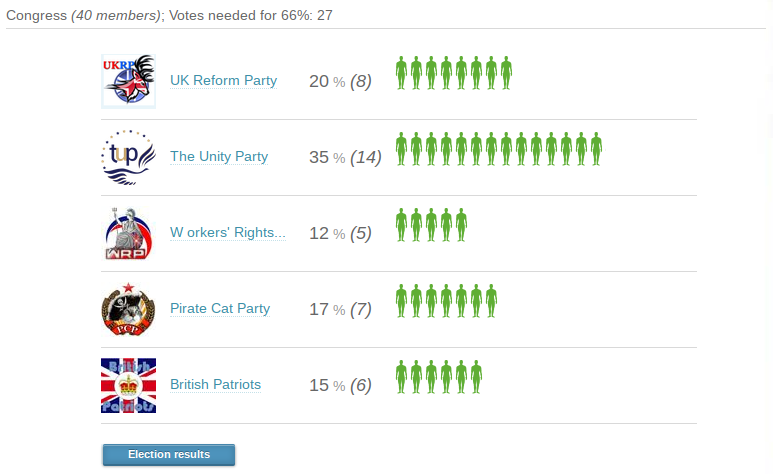The Economist ~ A guide to the politics module
 •
by
•
by Spite313

Dear friends
Today I’m going back to guides to hopefully cover the basic points of the politics module. Politics in eRepublik was originally advertised as one of the three main career paths/modules, and it retains significant functionality and purpose to this day. In real terms politics is the fastest way for a new player to become important to their country/the game, so it is valuable to have a guide explaining how it all works.
Election cycles
There are three elections each month, which run on a cycle roughly ten days long. The first election of each month is for the Country President on the 5th, the second election is for the Party President on the 15th, and the third election is for Congress on the 25th.

Country President
The Country President is the main representative and leader of the country on the international stage. As such the Country President is nominally the most important player in the country. Electing a bad President does not just mean you may lose wars or waste money, it can also mean that your countries reputation is damaged with players of other countries. This is why it is the most important election of each month.
Players must be at least level 18, be a party member, and be nominated by a political party (not necessarily their own) in order to run for President. There can be up to five candidates on the ballot paper. When a party nominates a player, it’s members are considered to support the candidate. Each candidate can have multiple nominations, and the 5 candidates with the most nominations are listed on the ballot. In most cases there will be 1-3 serious candidates in an election, with a couple of players who are supported by tiny parties with only 1-5 members and are running for fun not to win.
Good candidates will post manifestos in the run up to the election. Their manifesto will list their main strategy for the month, should they be elected. This strategy is sometimes called a platform, and generally you should consider the platform of each candidate before you make a decision on how to vote.
The Country President has access to certain ingame buttons that other players do not have. These are mainly used to propose laws. The following laws can be proposed by the President ingame:
- New citizen message: The Country President can change the message all new citizens get when they join the game. This should be changed every month to ensure it is up to date with the current details.
- Propose an alliance: An alliance, or mutual protection pact (MPP), allows citizens of our country to fight for our allies without having to move. It also shows friendship and trust between the countries. MPPs cost 10,000 currency for each country and last 30 days.
- Declare war: declarations of war open a direct conflict with another country. You can only declare war on a country if you share a border. Declaring war costs gold and it is not used much anymore because of that.
- Propose peace: This ends an active war.
- Propose Natural Enemy: A country can have one ‘natural enemy’ at a time. Natural enemy laws automatically open a war between two countries, and this does not cost any gold, so in recent times it has been used to start most wars. This also gives a 10% damage bonus when fighting the ‘natural enemy’ country. You can only change the ‘natural enemy’ every 7 days, so if you need to declare another war sooner than that you need to use the “declare war” function.
- Propose airstrike: An airstrike is a type of “declare war” that allows you to attack any country, anywhere, without needing a border. Airstrikes use up energy units (food) and currency, and you need to meet certain requirements in order to propose the law. In practice most countries have enough currency to airstrike, but they need to gather food in order to meet the energy requirements. You can see the requirements on your country’s military page.
- Trade Embargo: This allows you to stop your citizens selling products to a country, stop that country’s citizens selling products to you, and stop any of the citizens of the target country from using “work as manager” in any of your regions. A trade embargo is automatically put in place when two countries have an active war.
The President can also push buttons to decide which region to attack next when they have an open war and initiative (initiative is gained by winning a previous battle, or being the first to declare war).
They CP can also propose membership/leaving a formal ingame alliance. This requires a supermajority vote of Congress to pass.
The Country President can also appoint a government to help them with their duties. Historically the government was a meta-game (outside the game) function invented by players to make running the country more manageable. Now however there are certain ingame titles provided by the game administrators to help identify these people. Generally the government always contains:
Minister of Defence: Usually assigned the task of managing the military units and campaigns of the country on the President’s behalf.
Minister of Foreign Affairs: Usually deputises the President in speaking with other countries to arrange alliances, co-ordinate battle plans and share information.
It also sometimes contains:
Minister of Finance: Usually a player who tracks government spending, uses the money markets to generate revenue for the government, and has access to national organisations (non player accounts which every country has and can be used mainly for buying/selling gold)
Minister of Home Affairs: In the UK this is the name of this ministry, but many countries have something similar. The job involves dealing with domestic affairs and organising activities to keep players entertained and involved.
Minister of Legislative Affairs: Some countries have a government member who either leads or organises congress functions, or has some role in keeping them up to date. Sometimes this role is called the speaker.
The game has some titles which the President can give to people. These are Prime Minister, Minister of Defence, Minister of Foreign Affairs, Minister of Education and Governor. Players with these titles will appear on the Politics Page and their title will appear next to their name when they post on the national feed.
When elected as Country President you get a special medal on your profile, and 5 gold.

Party President
The Party President is elected on the 15th of each month.
Political parties are groups of players who share common values or goals. Each political party has its own ideas about how the game should be played, how the country should be managed and what goals they want to achieve. It is an important part of the game to join a party and every player should consider it. You can join a party when you reach level 16. You can also create a party, but that is a very bad idea for new players.
Once you are a party member, you can vote for who the Party President is each month. You can also nominate yourself as a candidate if you wish. Generally it is a good idea to spend some time in the party before you nominate yourself, and make yourself known as someone who works hard and is active, otherwise you won’t get any votes. You can nominate yourself and see candidates on the party page (Community tab).
The Party President, once elected, chooses the order of the congress list (more on this below) and also nominates players for the President role as described above. Apart from these two in-game functions, the Party President is also responsible for promoting the party in the media, contacting and updating party members with the latest news, managing any schemes the party may have and recruiting new members to join the party.
Like the Country President, the Party President can assign certain titles. These are:
- Vice President
- Spokesman
- Secretary General
- Councillor
These roles are very different for every party. However generally they are given to players who agree to help the Party President manage their party.
There is no medal or gold for being elected Party President. Only hard work and misery
😉

Congress
Congress has two main ingame functions. Firstly to propose and vote on laws: all laws proposed by the President must pass a vote by congress. However there are certain laws that can also be proposed by congress, and some which can only be proposed by congress. The laws congress members can propose are:
- Change taxes: allows congress to change import tax, VAT and work tax.
- Minimum wage: sets the national minimum wage. This should be as low as possible to allow commune working (working for nearly free and receiving supplies in return). All labour is equally valuable so there is no need for minimum wages.
- Country donations: This moves money collected by taxation from the “country accounts” to an organisation owned by the government, where it can be spent.
- Issue money: This turns gold into currency at a fixed rate of 0.005 gold (50 gold = 10,000 currency). The current ingame exchange rate is 0.003 (50 gold = 16666 currency) so this isn’t used either. It is more of a hangover from a time when each country would have its own currency with it’s own exchange rate. Printing money would devalue the currency.
- Natural Enemy: As above in the President section. The natural enemy law requires 66% of Congress to vote yes or it won't pass.
The second main role of congress is to provide a check on the power of the President. Some laws can only be proposed by congress (such as providing money to the government) and congress also has one special law it can pass to remove the President from office:
- Impeach President: The Congress can remove the President from office. Unlike the above votes which require a simple majority (50%+1), impeachment requires a supermajority (66% of the votes). When impeached, the second place candidate in the last Presidential election becomes President. If there is nobody to be President and you impeach, you have no President.
Each of the 5 largest political parties can propose candidates for congress. This takes the form of a list of candidates (up to the total number available for the country can be proposed). On election day, voters can see a list of the parties who have candidates. They vote for the party, not the individual candidates. The amount of congress members elected is decided by what percentage of the vote each party gets. For example, if there are 40 congress members in total, and Party A gets 25% of the votes, they will get 10 members of congress elected. This will be the first ten on the list provided by the Party President. This is why the order of candidates in the list is important: the closer you are to the top of the list, the more likely you are to be elected.
To candidate for congress you need to go to the Party Page. You can only do this from 16th to the 23rd of each month. On 24th the Party President can reorganise the list and the election occurs on the 25th.
If a country has 1 region, it electes 10 congress members, 2 regions it elects 20, 3 regions 30 and 4 regions 40. You gain 1 additional congress member for every region you have above the first forty regions. In practice, only the USA (which naturally has 50 regions) elects more than 40 congress members regularly. Large empires like Romania sometimes have more (currently 44). If you have no regions, you cannot elect a congress and only the President can vote. Without a congress, the laws unique to congress cannot be proposed. Wiped countries will usually try hard to get some regions before the deadline closes for congress on 23rd of the month.
Dictators
It is possible for a country to be ruled by a dictator. Dictatorships are formed by a civil war between the country’s military units. A dictatorship costs 1 million currency to propose, and a battle is started to establish the dictatorship. If successful, the dictator has almost all the powers of congress and the president, other than proposing a new citizen message or impeaching the President. Under a dictatorship elections still occur, but the players elected are effectively powerless.
Conclusions
As a new player, running for congress is one of the best ways to get involved fast. Hopefully this article is useful to current and future generations of new citizens in explaining in simple terms how each of the three elected positions work.
I appreciate this guide is a bit basic by my standards, and I will probably write a more sophisticated/philosophical piece in the near future explaining more about what the real functional role of politics/political office is in a national community. Thank you for reading,
Iain



Comments
A political guide expanded edition is needed.
politics is a very complex isssue here
good read anyway
Natural Enemy proposals require a supermajority to pass, too.
As do laws to join or leave an alliance. The latter of which can be proposed by a CP as well, provided that the country is member of an in-game alliance.
Germany is the reason why dictatorships are disreputable
Good job Iain - Voted and endorsed
I'll make sure I put that 5 currency to good use.
Nice comprehensive article
>Electing a bad President does not just mean you may lose wars or waste money, it can also mean that your countries reputation is damaged with players of other countries
u can't be Sirius :
Good starter.
v +c
Official ePolitics sunblock - bar-room ceilings
No epicpic, no vote and no comment
vote 😃
Why didn't you include the regional elections?
Oh wait, that module they announced, partially implemented, then dropped without saying why...
Why are you playing this game again?